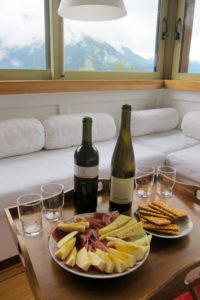Several weeks ago on a Saturday morning two members of the National Police visited the wine store of a friend. Both men had removed identification numbers from their uniforms. Their mannerisms were blunt and intimidating. They demanded to see all legal documentation regarding ownership of the wine store. My friend immediately complied, and presented these documents.
Strangely, one officer took out a personal cell phone and began, methodically, to photograph each document.
When the store owner heard this story later that morning, he promptly walked to the local station and demanded an explanation. Officers removing identification numbers? Police photographing proprietary legal documents with personal cameras? This all very odd.
So began the saga of what could be called the local wine store wars, in which a proprietor of one store (in a city to be unnamed) apparently courted local police officers – with off-duty afternoons spent sharing bottles together – before requesting that they harass the proprietor of a newly opened wine store in town. Which they did. And which, having now been informed of the wanton illegality of their actions, these officers are wishing to forget.

This is a neighborhood story. It took place in France. Yet it could have taken place in Italy, Argentina, or the United States. The difference of how it plays out depends on how strongly the civil servants of a country adhere to their legal systems. It is one thing to have laws, but an entirely different matter to ensure those laws are enforced.
It is likely that the wheels of justice will prevail, the perpetrators reprimanded, and the matter soon forgotten or transformed to a lesson about the folly of haste.
What is more intriguing is that the officers appear to have been instruments of another individual’s motive to kill competition.
Perhaps none of these individuals heard of the phrase, spoken frequently by ex-US President John F. Kennedy, that ‘a rising tide lifts all boats.’

This phrase was not invented by Kennedy, but adopted after he heard it spoken at a regional Chamber of Commerce meeting in New England. It means – economically – that when businesses better themselves financially, their actions often increase opportunities for neighbors to do alike. If a successful business draws more visitors and customers to a location, many other regional businesses are often better poised to increase their own sales.
Using a baton to squash competition also relates to the famed 1855 classification of Bordeaux wines – which is still considered valid. That year, at the behest of Emperor Napoleon III who was poised to host the world’s fair (‘Exposition Universelle’) in Paris, scouts visited Bordeaux to discern which wines were of the best quality, in order that they could be obtained and displayed to visitors in Paris.
Their selection of wines created a Bordeaux classification system – now more than a century and a half old – that is still utilized and considered by many as both practical and realistic.
Many merchants, wine producers, and critics never challenge the validity of this archaic system, contrary to the fact that common sense and ground realities indicate otherwise. Some other châteaux adjacent to these famed ‘first growth’ wines now produce wines that match or exceed the quality of wines listed in this ancient classification system. The unspoken belief is that this 1855 classification system should be considered valid because of its historical repute. This notion is quaint, but outdated.

Since the time of that classification, two world wars have been fought, the atom split, the airplane invented, the computer created, slaves emancipated, golf clubs teed off on the moon, and the horse and buggy replaced by the automobile. The world of agriculture was also reshaped in the past 170 years, including land management practices, technological innovations, pesticides, herbicides, management competency, climate alterations, quality control, and the economic impact of multiple external variables – including the invention of sophisticated processing equipment, the deployment of air cargo and container ships, and the viability of ‘flying winemakers’ – able to provide precise advice based on experience gained from working in dozens of countries.
If one wine store attracts more visitors to a location, all wine stores in the region can profit from the associated escalation of business. The notion that competition should be fended off by rigidly clinging to the status quo is, simply, outdated.






Karin
1 Sep 2015Aah, human foibles. Beautifully written Tomas!!! It could have been here in South Texas over a different commodity! Thanks for sharing.
vinoexpressions
2 Sep 2015Thanks for tuning in Karin! Yes, little dramas like this erupt all over the world. When they’re peaceful and able to be resolved, that’s a mark that civilization is marching forward 🙂
Karin
2 Sep 2015True that!!! Keep up the writing!!! You remind me of a traveling bard from times gone by! You certainly know how to write a tale!!
vinoexpressions
2 Sep 2015Ah, thanks Karin! I’m certain that being a Justice of the Peace in rural Texas has given you some wild stories. I seem to recall you took pity and reduced the bail bond for a young chap involved with drugs who wanted to turn his life around, then learned that he was set to inherit over a million dollars from oil money when he turned 25. And still everyone complained that the ‘reduced’ bail you set was still too high! And wasn’t there some lost llama causing havoc in the county? Enjoy all.
Trisha Ray
4 Sep 2015As a business owner, I always believed in the concept: “When businesses better themselves financially, their actions often increase opportunities for neighbors to do the same”. And it worked out for me. Resentment never brings good fortune!
Hope things work out – after reading the book, “60 Million Frenchmen can’t be Wrong”, I have the feeling the French system can deal well with moments like this one.
Good luck to the wine store entrepreneurs!
vinoexpressions
4 Sep 2015Indeed. Although stopping to take time for a good lunch here is sometimes more important than developing a business prospect – depending on the hour – the economy and quality of life here in France are in decent shape. And the local intrigue always makes for a good story…